
SQLAgent
SQLAgent 是一个 开源的(Open source)、大模型驱动的(LLM-Powered)、专注于私有化部署的Text2SQL 智能体(Agent) 项目(Project)
Stars: 2065
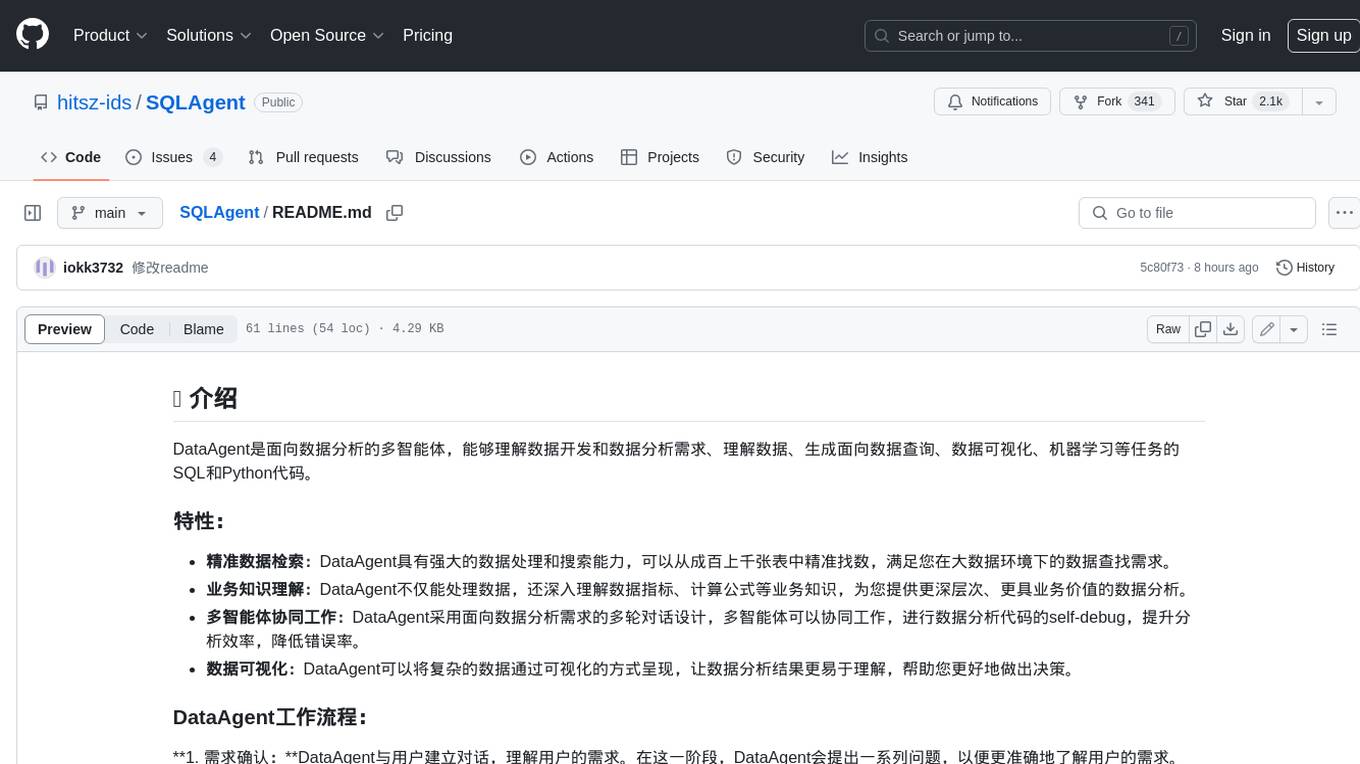
DataAgent is a multi-agent system for data analysis, capable of understanding data development and data analysis requirements, understanding data, and generating SQL and Python code for tasks such as data query, data visualization, and machine learning.
README:
DataAgent是面向数据分析的多智能体,能够理解数据开发和数据分析需求、理解数据、生成面向数据查询、数据可视化、机器学习等任务的SQL和Python代码。
- 精准数据检索:DataAgent具有强大的数据处理和搜索能力,可以从成百上千张表中精准找数,满足您在大数据环境下的数据查找需求。
- 业务知识理解:DataAgent不仅能处理数据,还深入理解数据指标、计算公式等业务知识,为您提供更深层次、更具业务价值的数据分析。
- 多智能体协同工作:DataAgent采用面向数据分析需求的多轮对话设计,多智能体可以协同工作,进行数据分析代码的self-debug,提升分析效率,降低错误率。
- 数据可视化:DataAgent可以将复杂的数据通过可视化的方式呈现,让数据分析结果更易于理解,帮助您更好地做出决策。
**1. 需求确认:**DataAgent与用户建立对话,理解用户的需求。在这一阶段,DataAgent会提出一系列问题,以便更准确地了解用户的需求。
**2. 任务规划:**DataAgent会根据最终确认的需求内容为用户制定任务规划。这个规划包括一系列步骤,DataAgent会按照这些步骤来为用户提供服务。
**3. 任务执行:**DataAgent将规划好的任务分配给不同的智能体,如数据查找智能体、SQL生成智能体、代码生成智能体、可视化分析智能体等。每个智能体负责其专业领域的任务执行,协同工作以确保任务的高效完成。
**4.应用生成:**DataAgent根据用户需求任务将结果数据转化为应用成果,如指标大屏展示、数据API服务和数据应用等,这些成果能够以可视化的形式展示关键数据指标,提供API接口供其他系统或服务调用,以及根据用户需求生成具体的应用程序。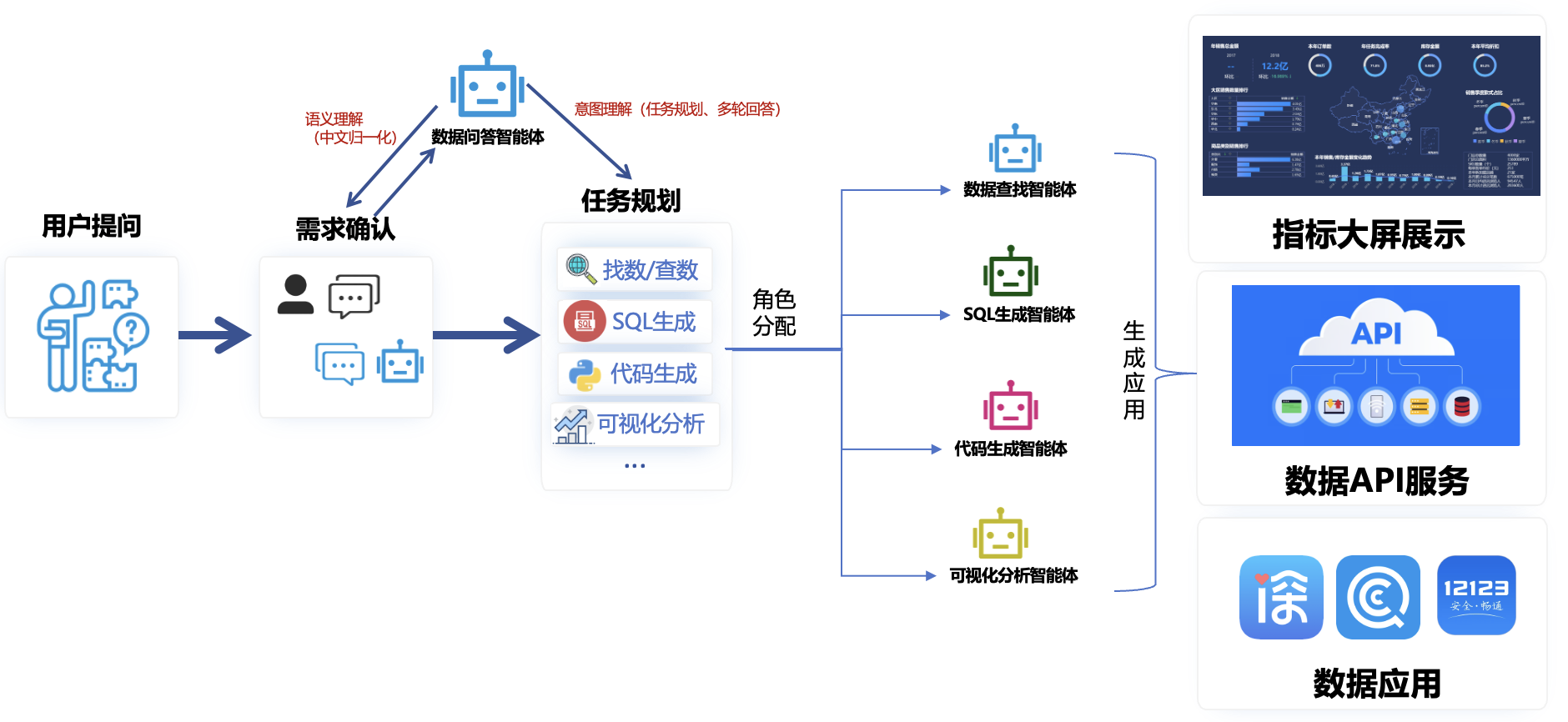
- [x] SQL生成
- [x] 数据接入
- [x] 知识库
- [ ] 语料库
- [ ] 图表生成
- [ ] 任务规划
https://www.yuque.com/biehuitou/dasgwp/gxii4gkkvudskf4k?singleDoc# 《DataAgent部署》
https://www.yuque.com/biehuitou/dasgwp/nhvzgnpyq7cmy590?singleDoc# 《模型部署》
添加你的数据源
data-agent datasource add
训练数据源的schema
data-agent datasource sync
启用要使用的数据源
data-agent datasource enable
禁用要使用的数据源
data-agent datasource disable
查询当前可用的数据源
data-agent datasource ls
我们欢迎各种贡献和建议,共同努力,使本项目更上一层楼!麻烦遵循以下步骤:
- 步骤1: 如果您想添加任何额外的功能、增强功能或在使用过程中遇到任何问题,请发布一个 问题 。如果您能遵循 问题模板 我们将不胜感激。问题将在那里被讨论和分配。
- 步骤2: 无论何时,当一个问题被分配后,您都可以按照 PR模板 创建一个 拉取请求 进行贡献。您也可以认领任何公开的问题。共同努力,我们可以使DataAgents变得更好!
- 步骤3: 在审查和讨论后,PR将被合并或迭代。感谢您的贡献!
在您开始之前,我们强烈建议您花一点时间检查 这里 再进行贡献。
请在这里查看完整文档,将随着demo更改和代码发布更新。
For Tasks:
Click tags to check more tools for each tasksFor Jobs:
Alternative AI tools for SQLAgent
Similar Open Source Tools

SQLAgent
DataAgent is a multi-agent system for data analysis, capable of understanding data development and data analysis requirements, understanding data, and generating SQL and Python code for tasks such as data query, data visualization, and machine learning.
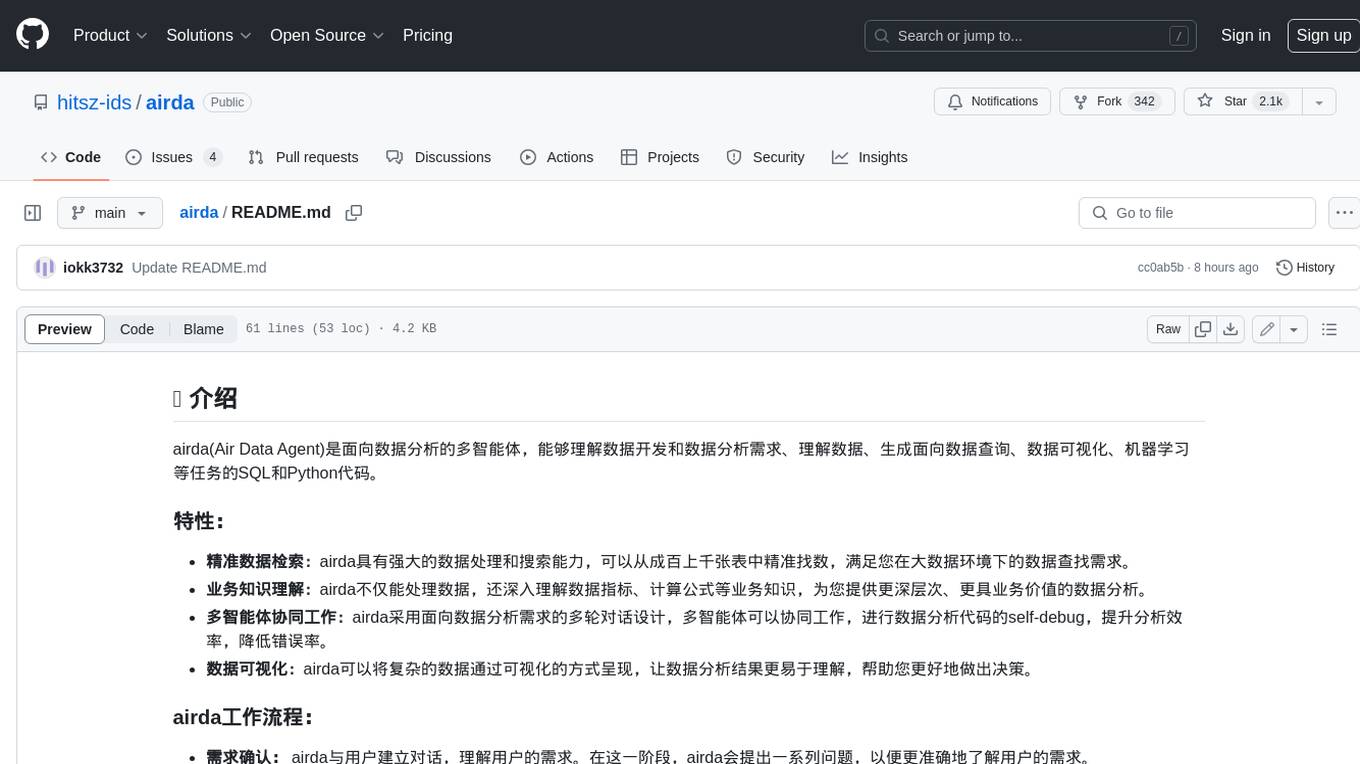
airda
airda(Air Data Agent) is a multi-agent system for data analysis, which can understand data development and data analysis requirements, understand data, and generate SQL and Python code for data query, data visualization, machine learning and other tasks.

LabelQuick
LabelQuick_V2.0 is a fast image annotation tool designed and developed by the AI Horizon team. This version has been optimized and improved based on the previous version. It provides an intuitive interface and powerful annotation and segmentation functions to efficiently complete dataset annotation work. The tool supports video object tracking annotation, quick annotation by clicking, and various video operations. It introduces the SAM2 model for accurate and efficient object detection in video frames, reducing manual intervention and improving annotation quality. The tool is designed for Windows systems and requires a minimum of 6GB of memory.
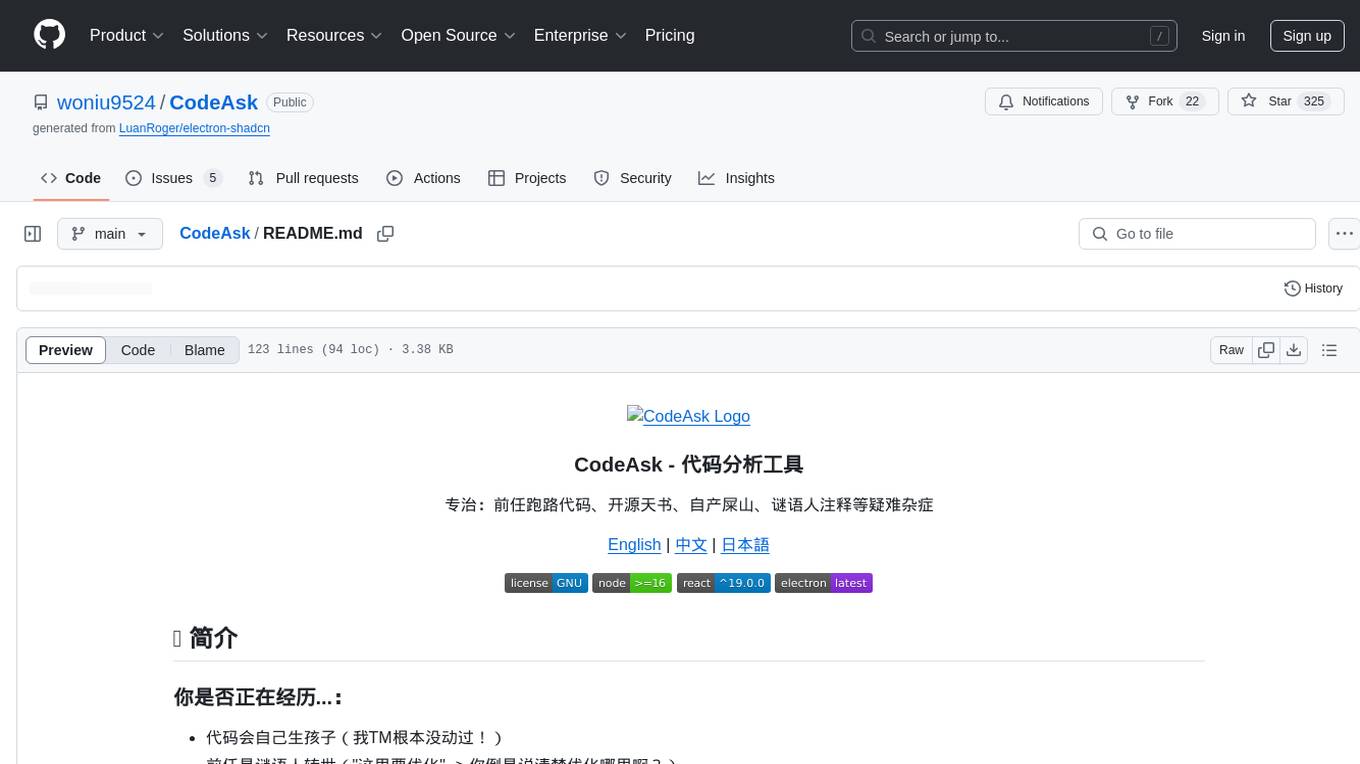
CodeAsk
CodeAsk is a code analysis tool designed to tackle complex issues such as code that seems to self-replicate, cryptic comments left by predecessors, messy and unclear code, and long-lasting temporary solutions. It offers intelligent code organization and analysis, security vulnerability detection, code quality assessment, and other interesting prompts to help users understand and work with legacy code more efficiently. The tool aims to translate 'legacy code mountains' into understandable language, creating an illusion of comprehension and facilitating knowledge transfer to new team members.
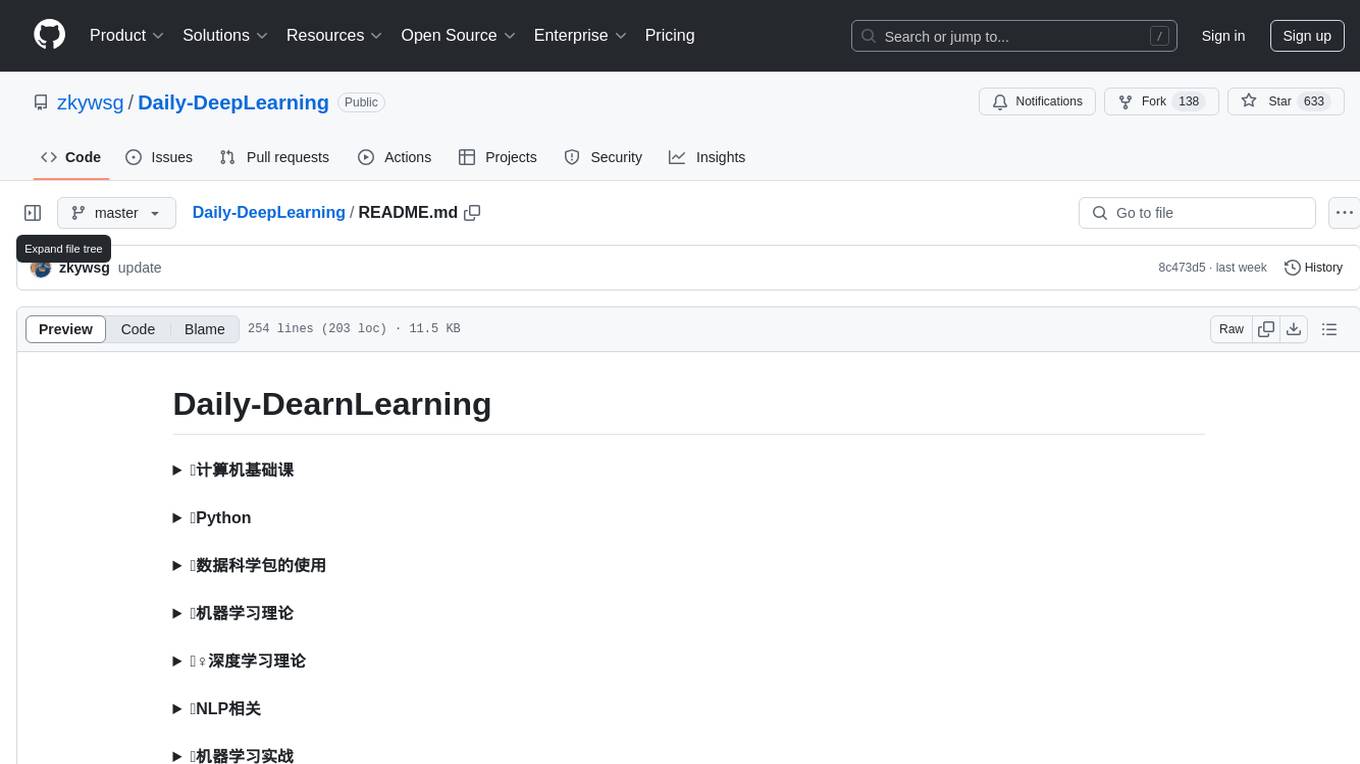
Daily-DeepLearning
Daily-DeepLearning is a repository that covers various computer science topics such as data structures, operating systems, computer networks, Python programming, data science packages like numpy, pandas, matplotlib, machine learning theories, deep learning theories, NLP concepts, machine learning practical applications, deep learning practical applications, and big data technologies like Hadoop and Hive. It also includes coding exercises related to '剑指offer'. The repository provides detailed explanations and examples for each topic, making it a comprehensive resource for learning and practicing different aspects of computer science and data-related fields.
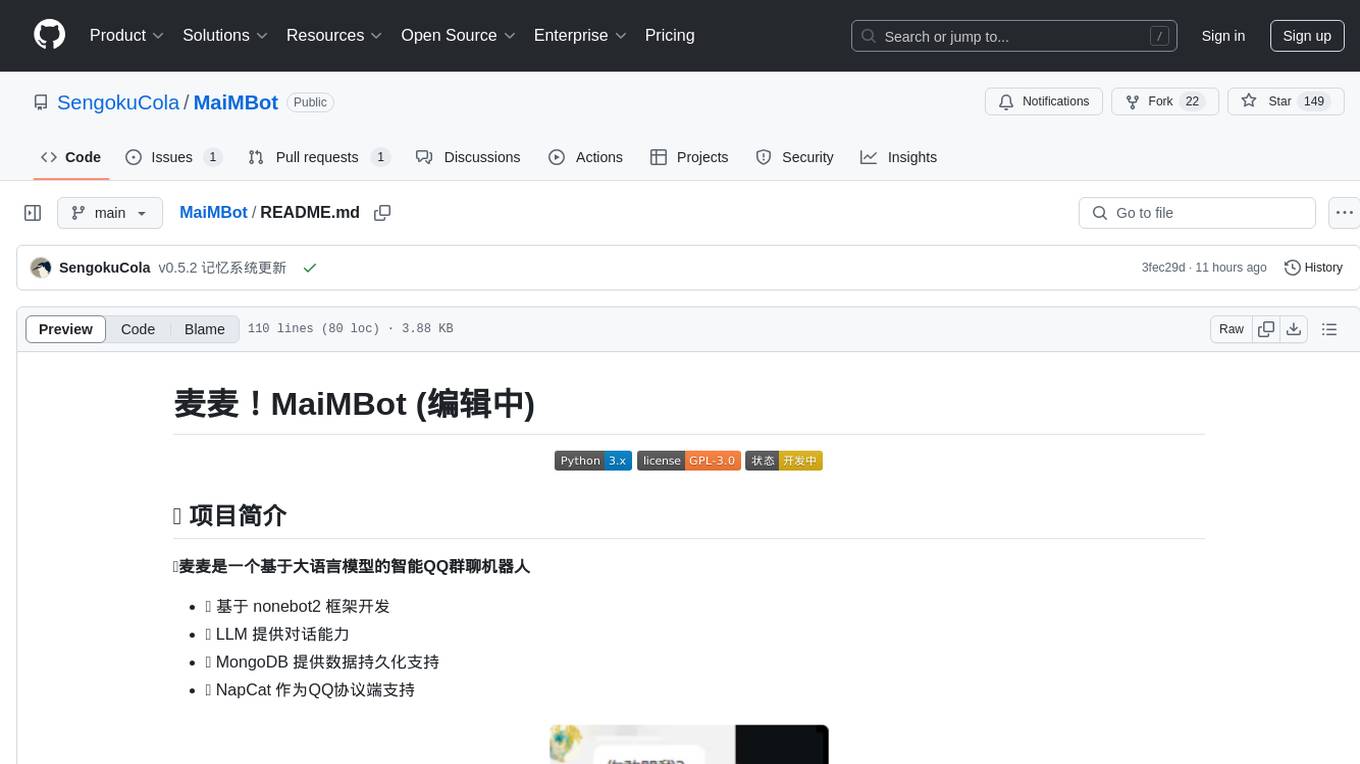
MaiMBot
MaiMBot is an intelligent QQ group chat bot based on a large language model. It is developed using the nonebot2 framework, utilizes LLM for conversation abilities, MongoDB for data persistence, and NapCat for QQ protocol support. The bot features keyword-triggered proactive responses, dynamic prompt construction, support for images and message forwarding, typo generation, multiple replies, emotion-based emoji responses, daily schedule generation, user relationship management, knowledge base, and group impressions. Work-in-progress features include personality, group atmosphere, image handling, humor, meme functions, and Minecraft interactions. The tool is in active development with plans for GIF compatibility, mini-program link parsing, bug fixes, documentation improvements, and logic enhancements for emoji sending.
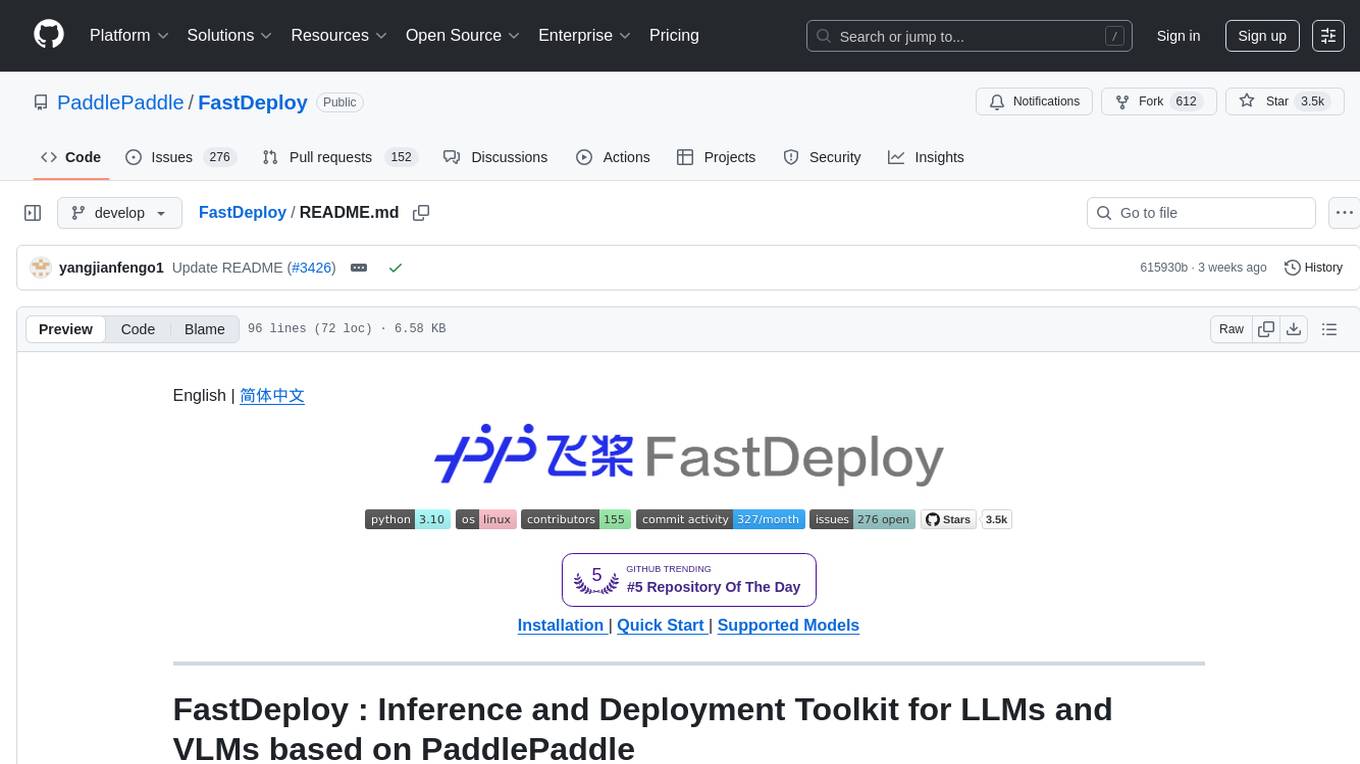
FastDeploy
FastDeploy is an inference and deployment toolkit for large language models and visual language models based on PaddlePaddle. It provides production-ready deployment solutions with core acceleration technologies such as load-balanced PD disaggregation, unified KV cache transmission, OpenAI API server compatibility, comprehensive quantization format support, advanced acceleration techniques, and multi-hardware support. The toolkit supports various hardware platforms like NVIDIA GPUs, Kunlunxin XPUs, Iluvatar GPUs, Enflame GCUs, and Hygon DCUs, with plans for expanding support to Ascend NPU and MetaX GPU. FastDeploy aims to optimize resource utilization, throughput, and performance for inference and deployment tasks.
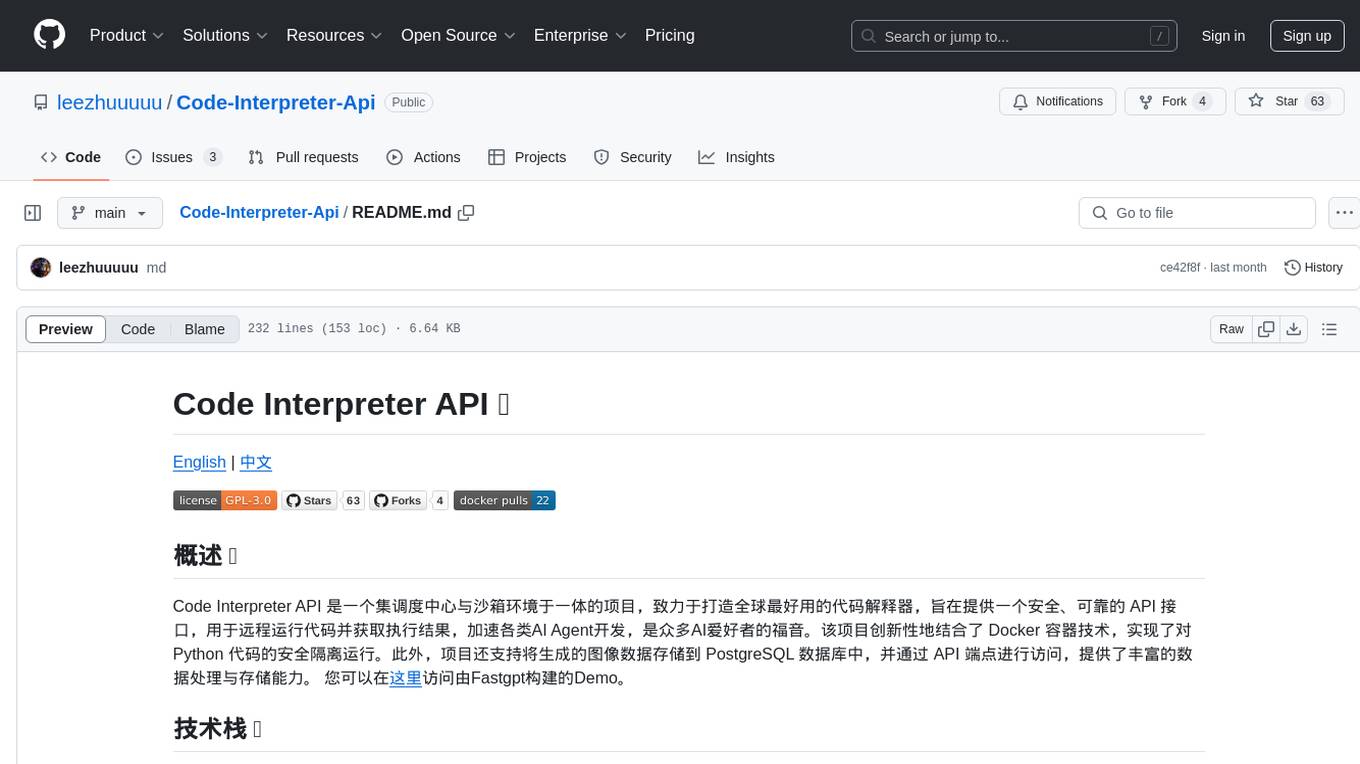
Code-Interpreter-Api
Code Interpreter API is a project that combines a scheduling center with a sandbox environment, dedicated to creating the world's best code interpreter. It aims to provide a secure, reliable API interface for remotely running code and obtaining execution results, accelerating the development of various AI agents, and being a boon to many AI enthusiasts. The project innovatively combines Docker container technology to achieve secure isolation and execution of Python code. Additionally, the project supports storing generated image data in a PostgreSQL database and accessing it through API endpoints, providing rich data processing and storage capabilities.
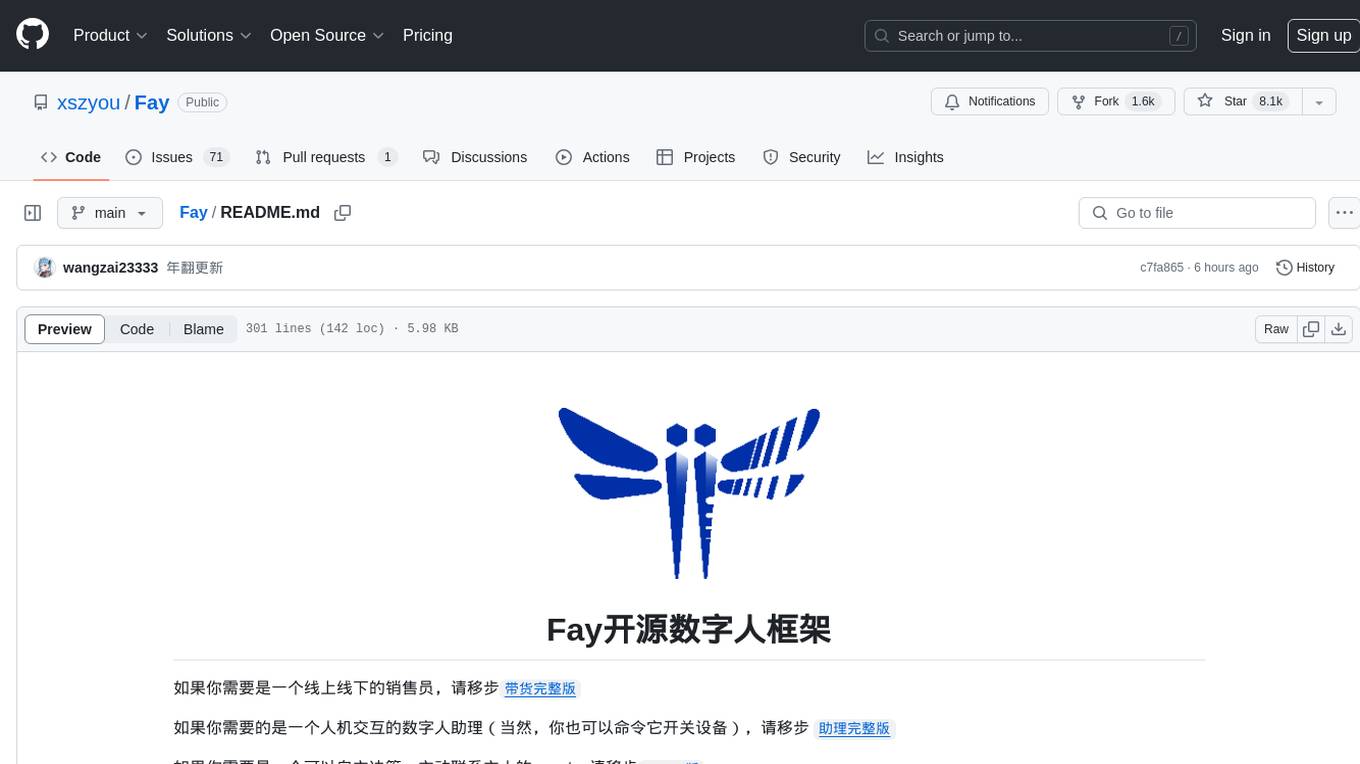
Fay
Fay is an open-source digital human framework that offers different versions for various purposes. The '带货完整版' is suitable for online and offline salespersons. The '助理完整版' serves as a human-machine interactive digital assistant that can also control devices upon command. The 'agent版' is designed to be an autonomous agent capable of making decisions and contacting its owner. The framework provides updates and improvements across its different versions, including features like emotion analysis integration, model optimizations, and compatibility enhancements. Users can access detailed documentation for each version through the provided links.
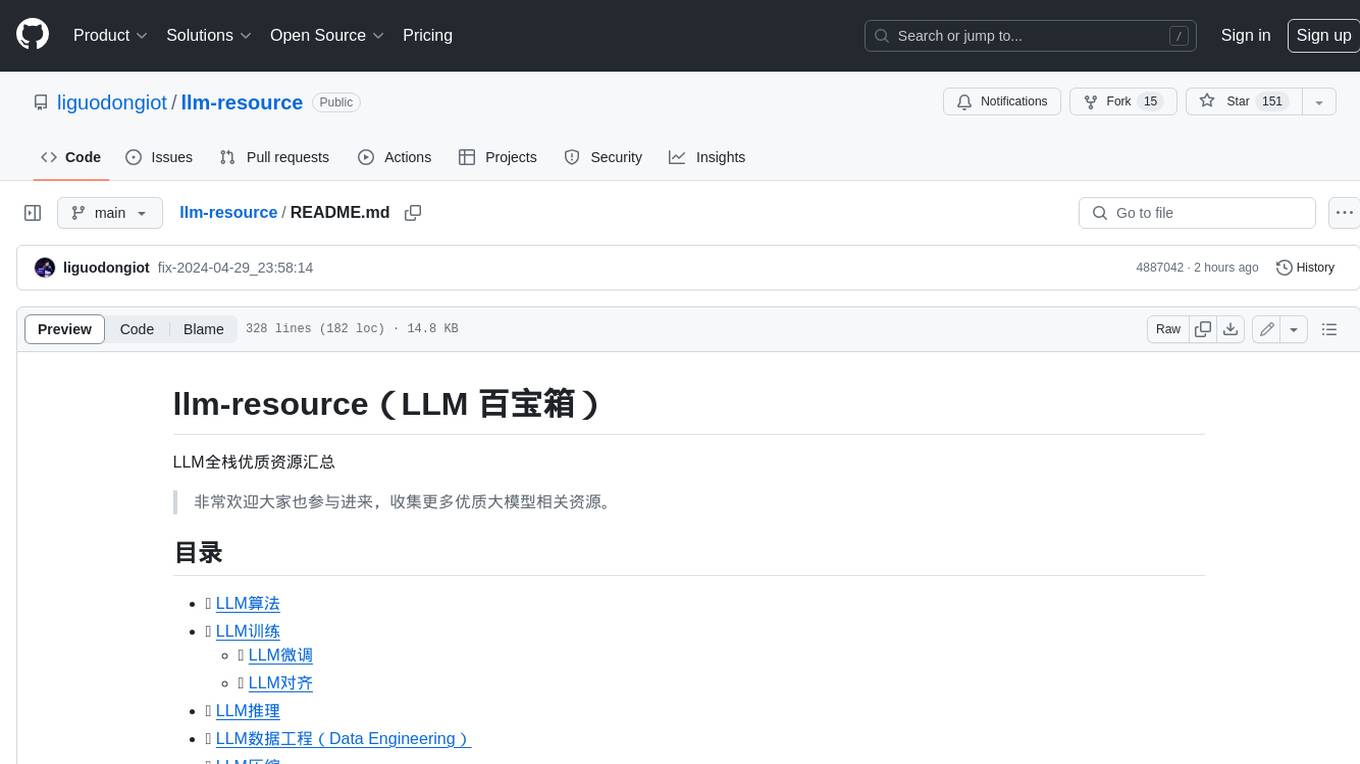
llm-resource
llm-resource is a comprehensive collection of high-quality resources for Large Language Models (LLM). It covers various aspects of LLM including algorithms, training, fine-tuning, alignment, inference, data engineering, compression, evaluation, prompt engineering, AI frameworks, AI basics, AI infrastructure, AI compilers, LLM application development, LLM operations, AI systems, and practical implementations. The repository aims to gather and share valuable resources related to LLM for the community to benefit from.
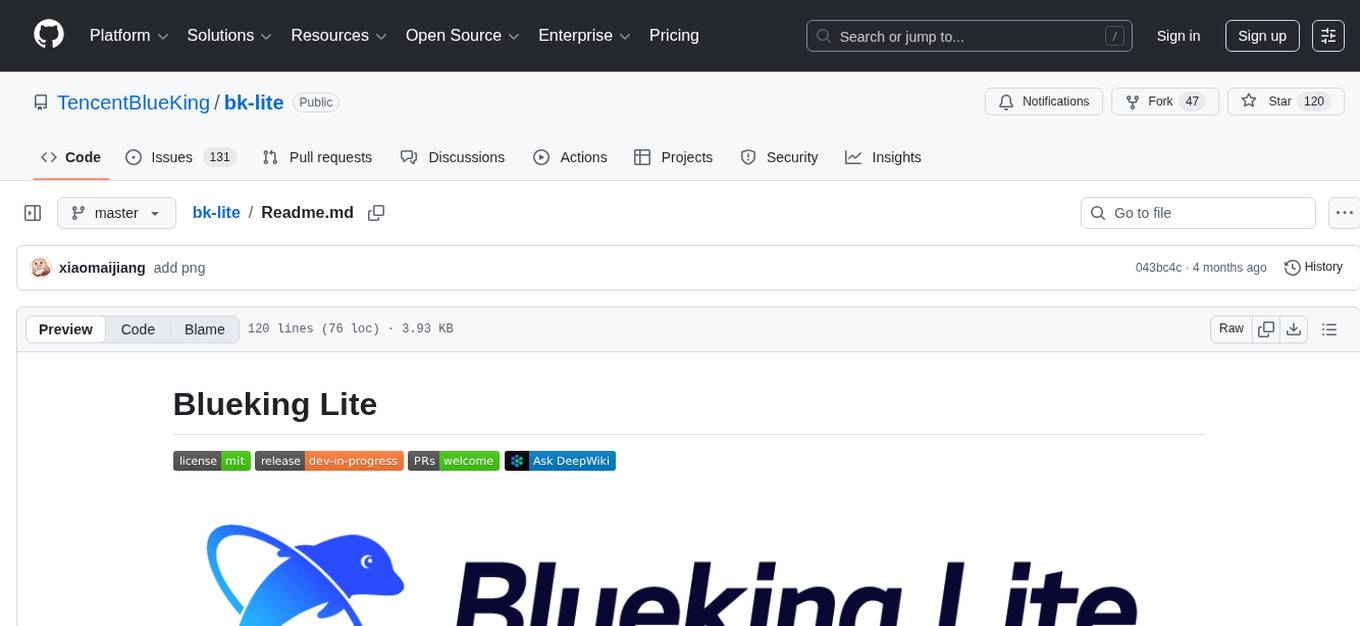
bk-lite
Blueking Lite is an AI First lightweight operation product with low deployment resource requirements, low usage costs, and progressive experience, providing essential tools for operation administrators.
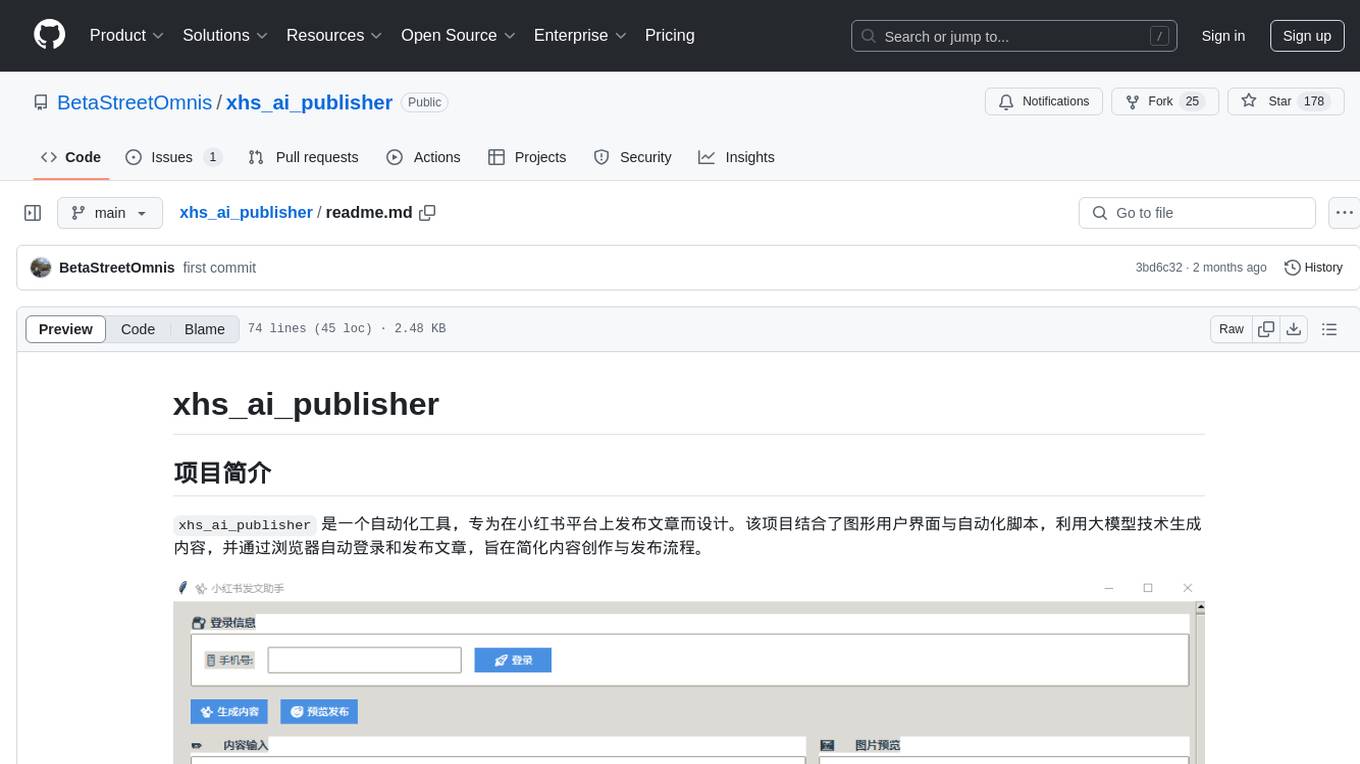
xhs_ai_publisher
xhs_ai_publisher is an automation tool designed for publishing articles on the Xiaohongshu platform. It combines a graphical user interface with automation scripts to generate content using large model technology. The tool simplifies the content creation and publishing process by automatically logging in and publishing articles through a web browser.
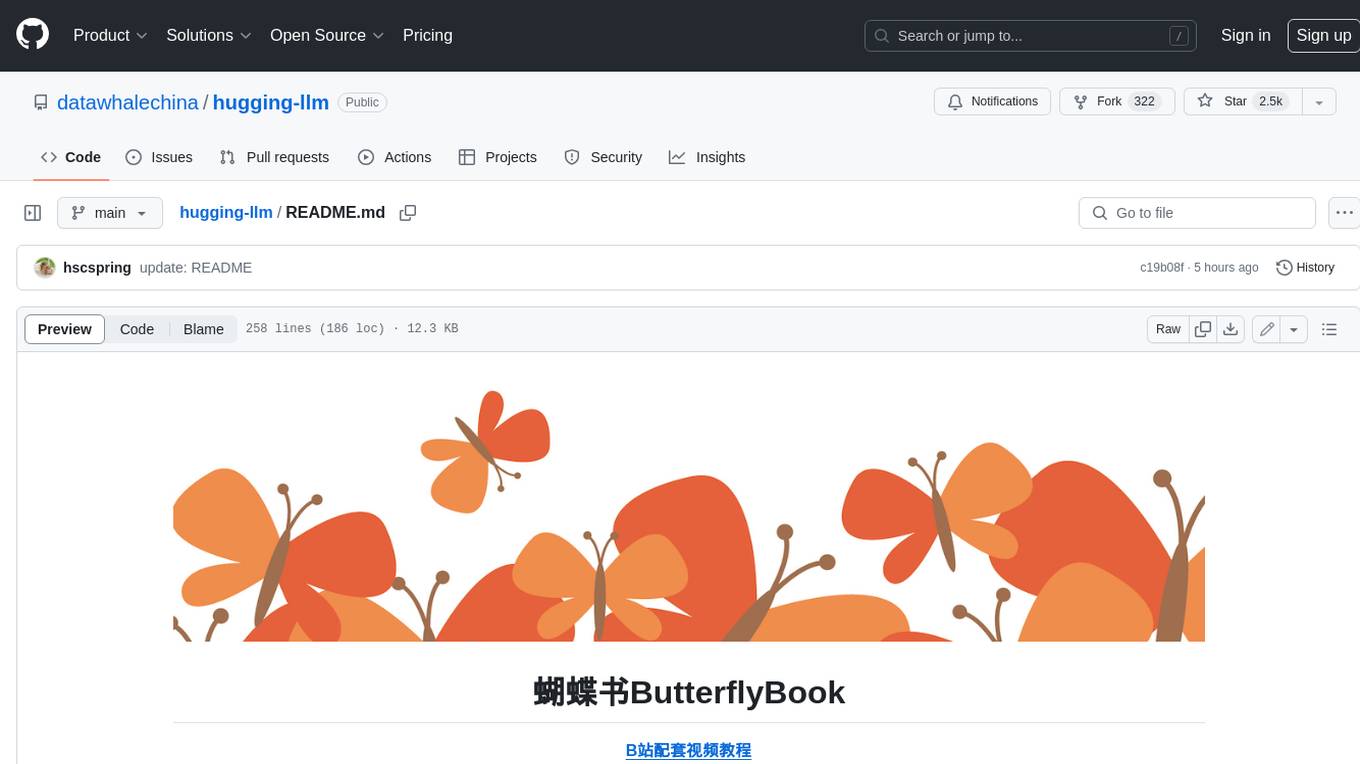
hugging-llm
HuggingLLM is a project that aims to introduce ChatGPT to a wider audience, particularly those interested in using the technology to create new products or applications. The project focuses on providing practical guidance on how to use ChatGPT-related APIs to create new features and applications. It also includes detailed background information and system design introductions for relevant tasks, as well as example code and implementation processes. The project is designed for individuals with some programming experience who are interested in using ChatGPT for practical applications, and it encourages users to experiment and create their own applications and demos.
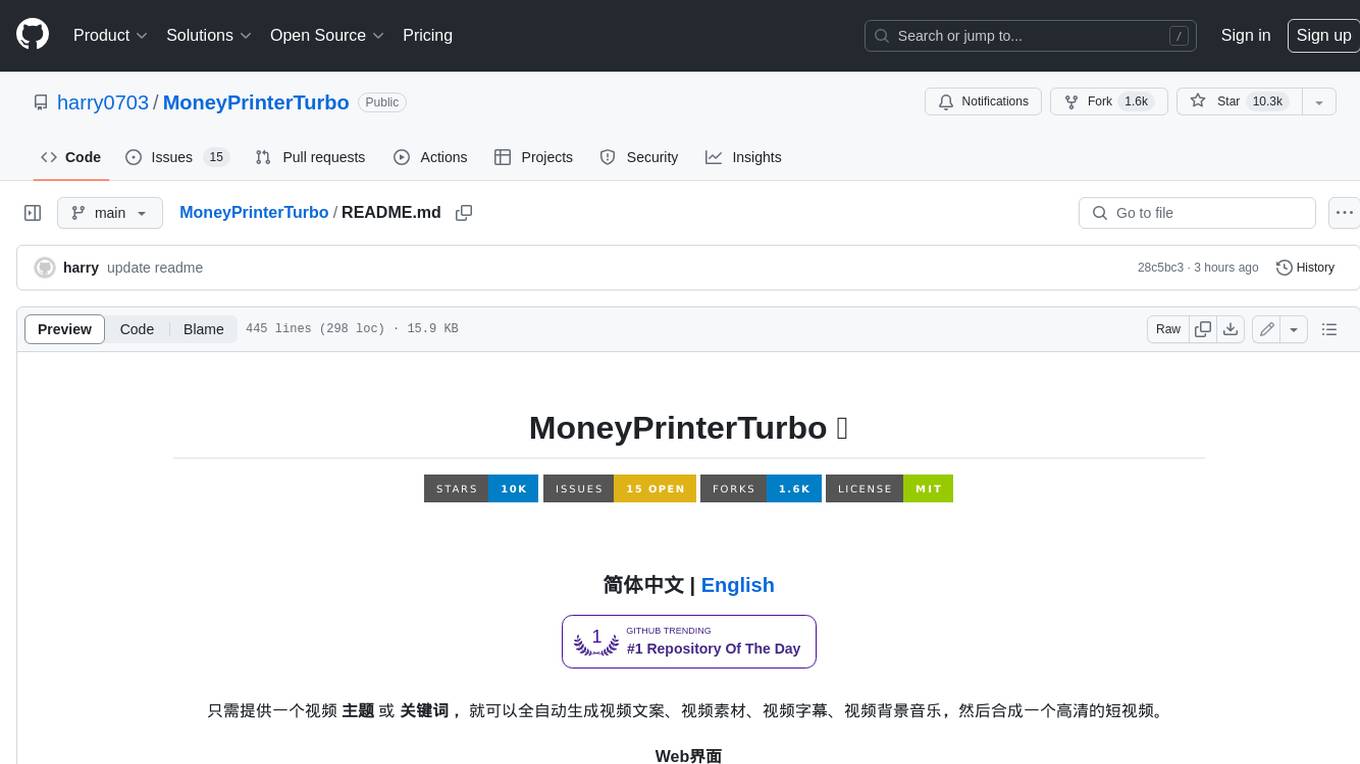
MoneyPrinterTurbo
MoneyPrinterTurbo is a tool that can automatically generate video content based on a provided theme or keyword. It can create video scripts, materials, subtitles, and background music, and then compile them into a high-definition short video. The tool features a web interface and an API interface, supporting AI-generated video scripts, customizable scripts, multiple HD video sizes, batch video generation, customizable video segment duration, multilingual video scripts, multiple voice synthesis options, subtitle generation with font customization, background music selection, access to high-definition and copyright-free video materials, and integration with various AI models like OpenAI, moonshot, Azure, and more. The tool aims to simplify the video creation process and offers future plans to enhance voice synthesis, add video transition effects, provide more video material sources, offer video length options, include free network proxies, enable real-time voice and music previews, support additional voice synthesis services, and facilitate automatic uploads to YouTube platform.
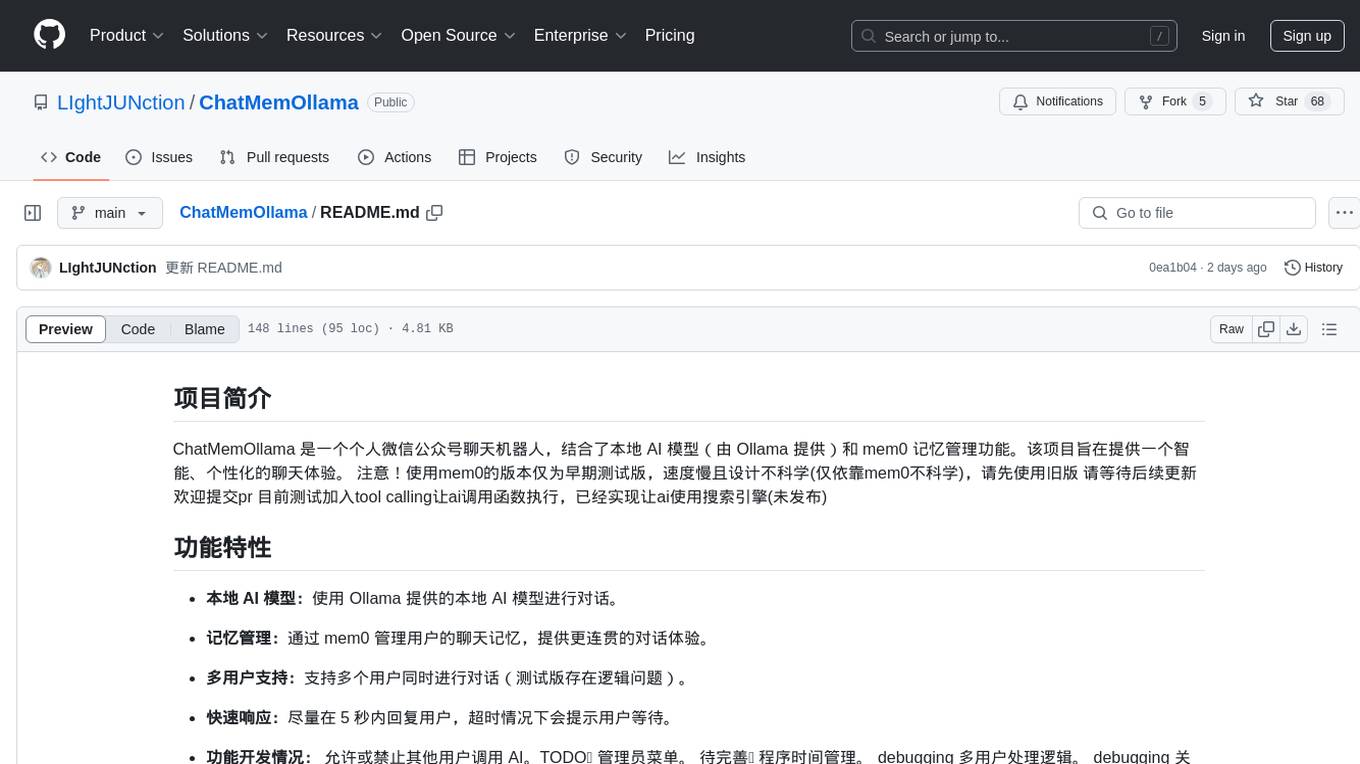
ChatMemOllama
ChatMemOllama is a personal WeChat public account chatbot that combines a local AI model (provided by Ollama) and mem0 memory management functionality. The project aims to provide an intelligent, personalized chat experience. It features a local AI model for conversation, memory management through mem0 for a coherent dialogue experience, support for multiple users simultaneously (with logic issues in the test version), and quick responses within 5 seconds to users with timeout prompts. It allows or prohibits other users from calling AI, with ongoing development tasks including debugging multiple user handling logic and keyword replies, and completed tasks such as basic conversation and tool calling. The ultimate goal is to wait for pre-task testing completion.
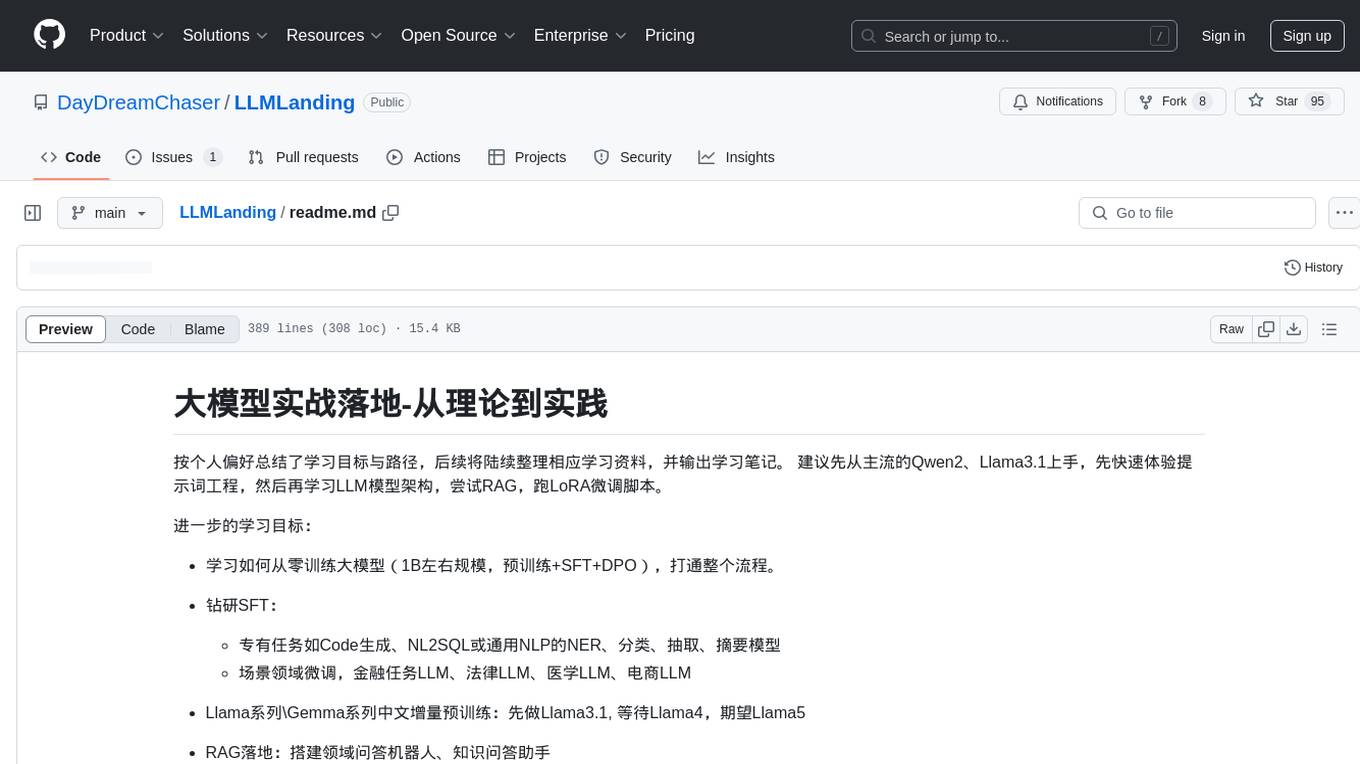
LLMLanding
LLMLanding is a repository focused on practical implementation of large models, covering topics from theory to practice. It provides a structured learning path for training large models, including specific tasks like training 1B-scale models, exploring SFT, and working on specialized tasks such as code generation, NLP tasks, and domain-specific fine-tuning. The repository emphasizes a dual learning approach: quickly applying existing tools for immediate output benefits and delving into foundational concepts for long-term understanding. It offers detailed resources and pathways for in-depth learning based on individual preferences and goals, combining theory with practical application to avoid overwhelm and ensure sustained learning progress.
For similar tasks

Azure-Analytics-and-AI-Engagement
The Azure-Analytics-and-AI-Engagement repository provides packaged Industry Scenario DREAM Demos with ARM templates (Containing a demo web application, Power BI reports, Synapse resources, AML Notebooks etc.) that can be deployed in a customer’s subscription using the CAPE tool within a matter of few hours. Partners can also deploy DREAM Demos in their own subscriptions using DPoC.

SQLAgent
DataAgent is a multi-agent system for data analysis, capable of understanding data development and data analysis requirements, understanding data, and generating SQL and Python code for tasks such as data query, data visualization, and machine learning.
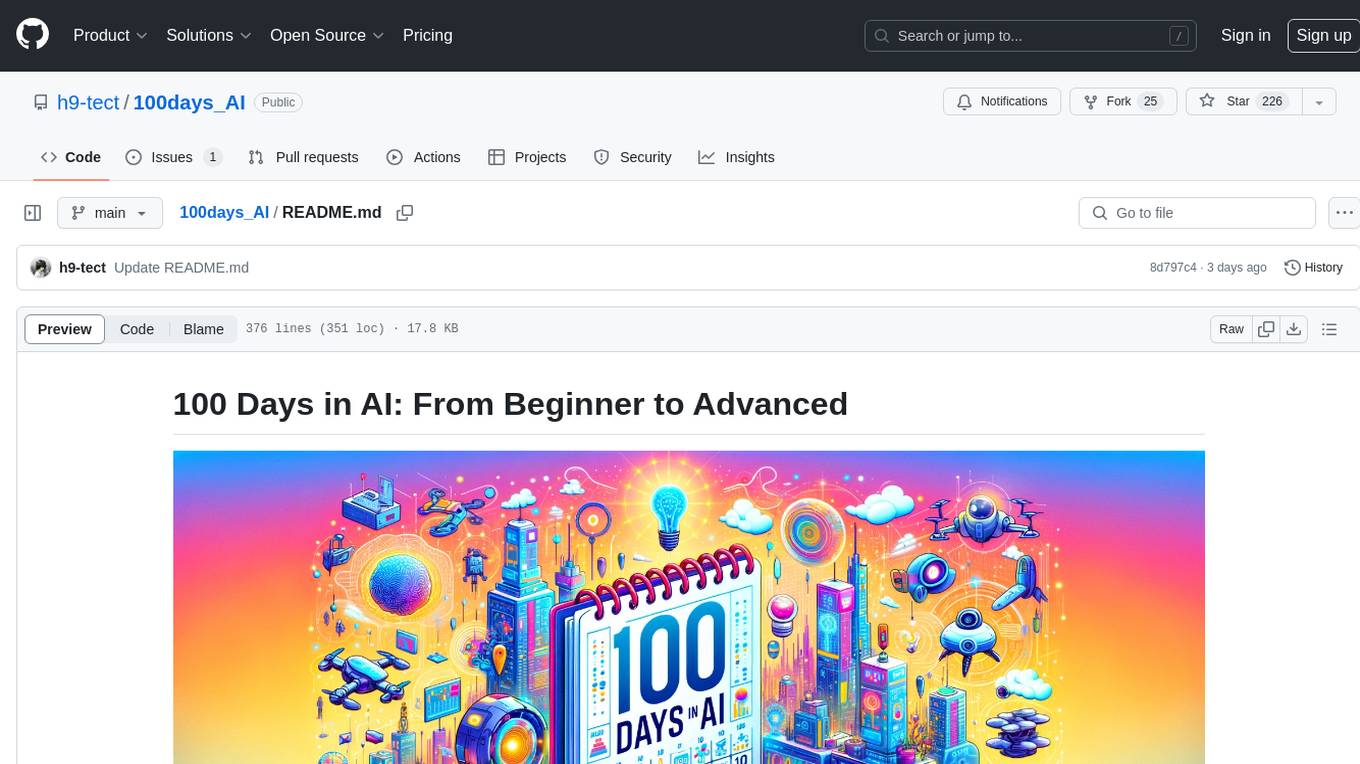
100days_AI
The 100 Days in AI repository provides a comprehensive roadmap for individuals to learn Artificial Intelligence over a period of 100 days. It covers topics ranging from basic programming in Python to advanced concepts in AI, including machine learning, deep learning, and specialized AI topics. The repository includes daily tasks, resources, and exercises to ensure a structured learning experience. By following this roadmap, users can gain a solid understanding of AI and be prepared to work on real-world AI projects.
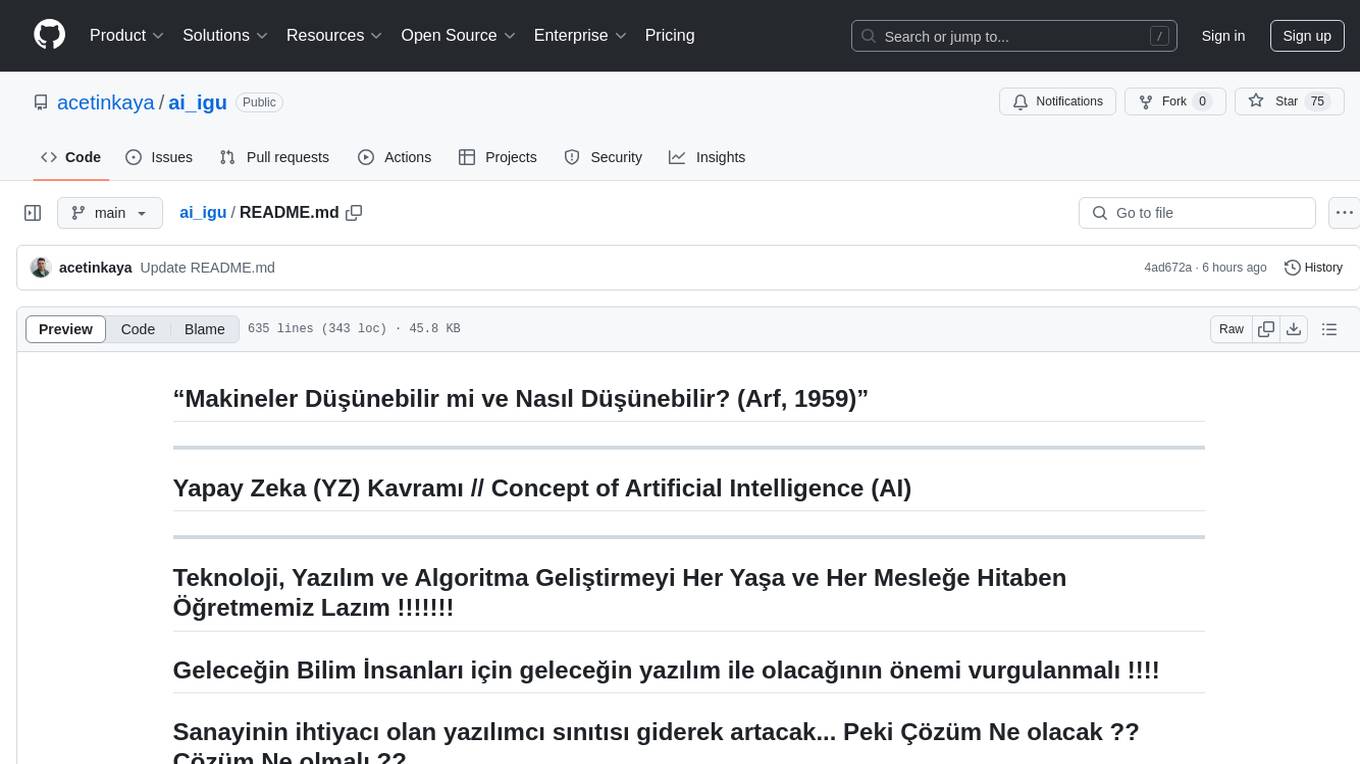
ai_igu
AI-IGU is a GitHub repository focused on Artificial Intelligence (AI) concepts, technology, software development, and algorithm improvement for all ages and professions. It emphasizes the importance of future software for future scientists and the increasing need for software developers in the industry. The repository covers various topics related to AI, including machine learning, deep learning, data mining, data science, big data, and more. It provides educational materials, practical examples, and hands-on projects to enhance software development skills and create awareness in the field of AI.
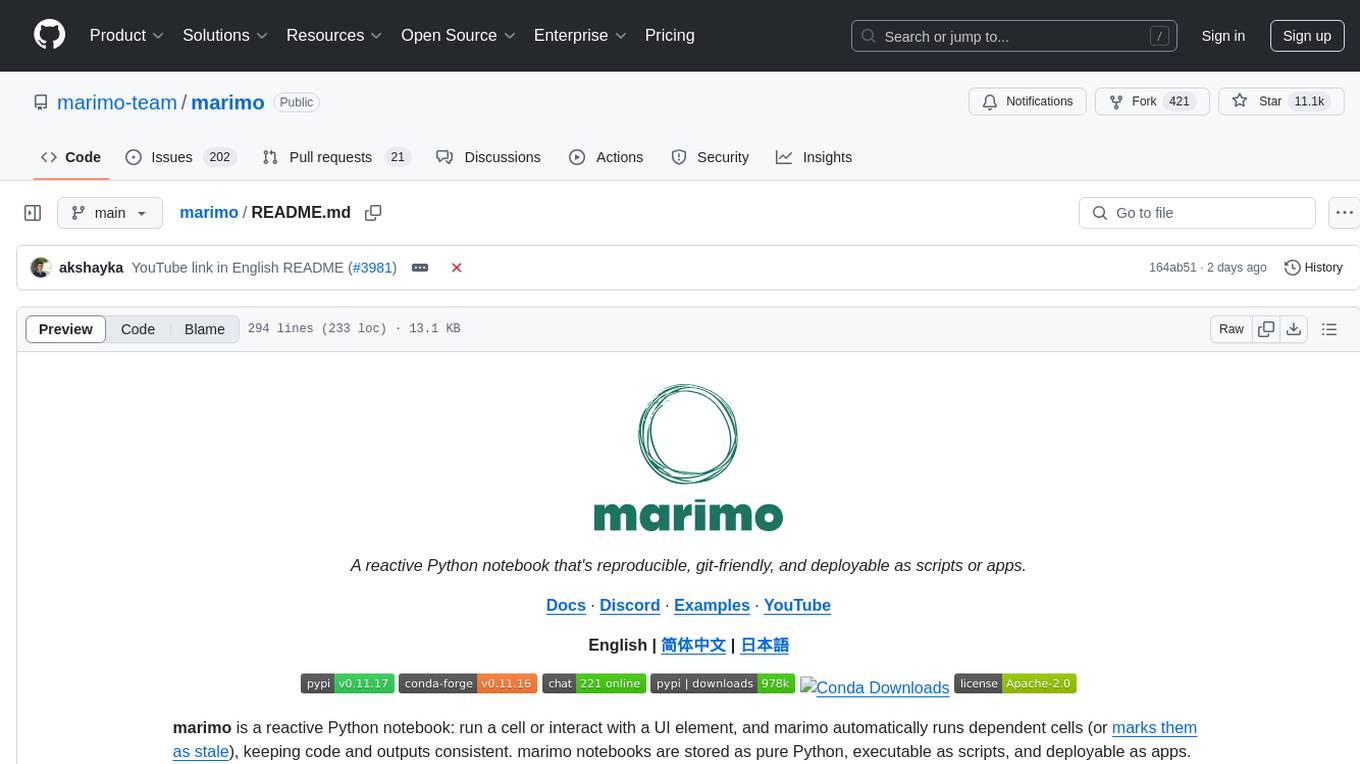
marimo
Marimo is a reactive Python notebook that ensures code and outputs consistency by automatically running dependent cells or marking them as stale. It replaces various tools like Jupyter, streamlit, and more, offering an interactive environment with features like binding UI elements to Python, reproducibility, executability as scripts or apps, shareability, and designed for data tasks. It is git-friendly, offers a modern editor with AI assistants, and comes with built-in package management. Marimo provides deterministic execution order, dynamic markdown and SQL capabilities, and a performant runtime. It is easy to get started with and suitable for both beginners and power users.
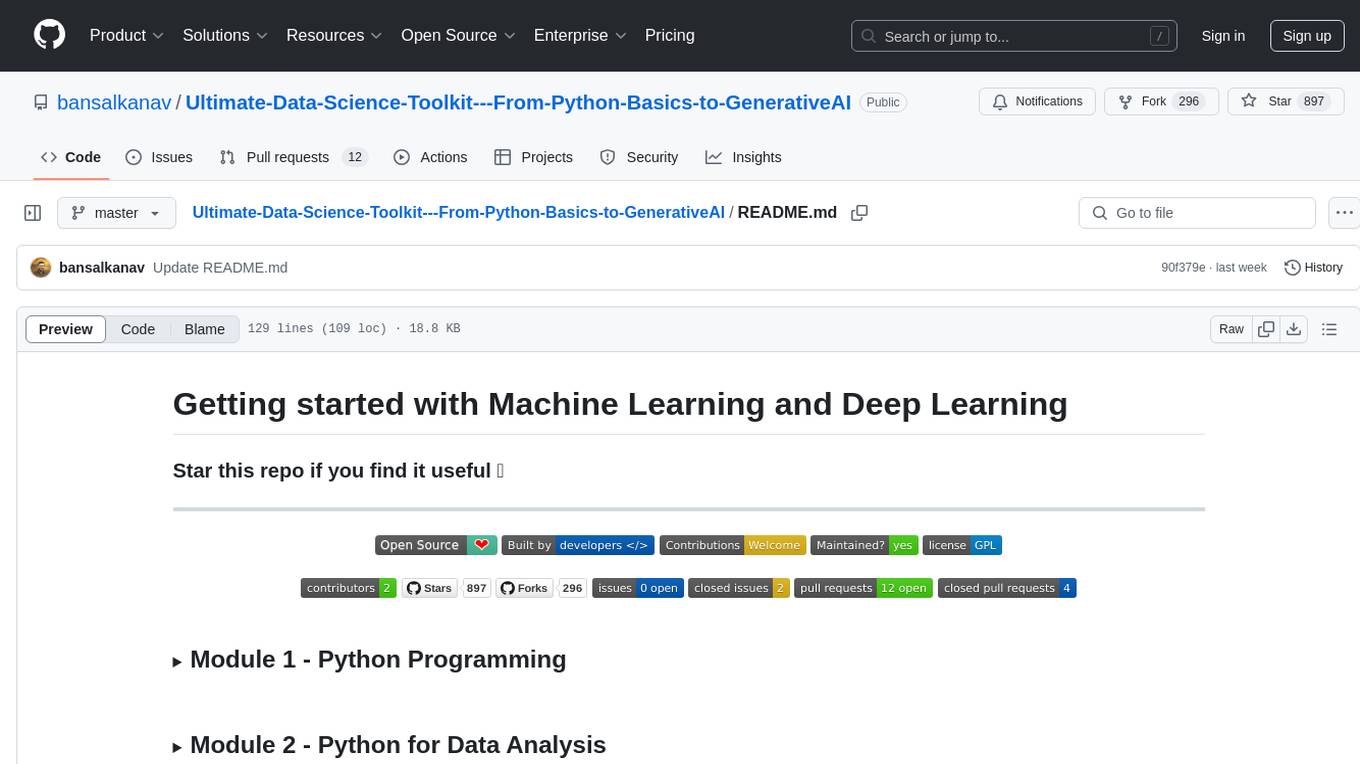
Ultimate-Data-Science-Toolkit---From-Python-Basics-to-GenerativeAI
Ultimate Data Science Toolkit is a comprehensive repository covering Python basics to Generative AI. It includes modules on Python programming, data analysis, statistics, machine learning, MLOps, case studies, and deep learning. The repository provides detailed tutorials on various topics such as Python data structures, control statements, functions, modules, object-oriented programming, exception handling, file handling, web API, databases, list comprehension, lambda functions, Pandas, Numpy, data visualization, statistical analysis, supervised and unsupervised machine learning algorithms, model serialization, ML pipeline orchestration, case studies, and deep learning concepts like neural networks and autoencoders.
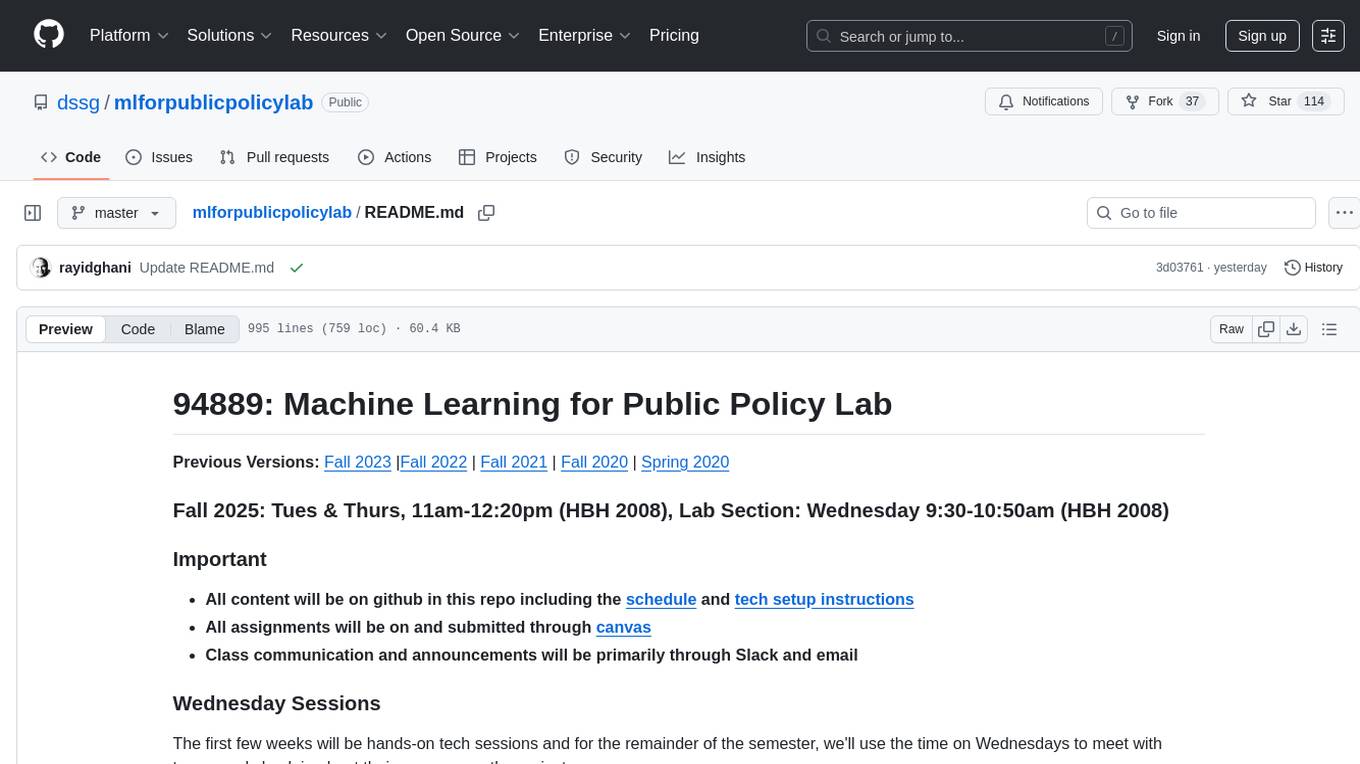
mlforpublicpolicylab
The Machine Learning for Public Policy Lab is a project-based course focused on solving real-world problems using machine learning in the context of public policy and social good. Students will gain hands-on experience building end-to-end machine learning systems, developing skills in problem formulation, working with messy data, communicating with non-technical stakeholders, model interpretability, and understanding algorithmic bias & disparities. The course covers topics such as project scoping, data acquisition, feature engineering, model evaluation, bias and fairness, and model interpretability. Students will work in small groups on policy projects, with graded components including project proposals, presentations, and final reports.

airda
airda(Air Data Agent) is a multi-agent system for data analysis, which can understand data development and data analysis requirements, understand data, and generate SQL and Python code for data query, data visualization, machine learning and other tasks.
For similar jobs

Azure-Analytics-and-AI-Engagement
The Azure-Analytics-and-AI-Engagement repository provides packaged Industry Scenario DREAM Demos with ARM templates (Containing a demo web application, Power BI reports, Synapse resources, AML Notebooks etc.) that can be deployed in a customer’s subscription using the CAPE tool within a matter of few hours. Partners can also deploy DREAM Demos in their own subscriptions using DPoC.

skyvern
Skyvern automates browser-based workflows using LLMs and computer vision. It provides a simple API endpoint to fully automate manual workflows, replacing brittle or unreliable automation solutions. Traditional approaches to browser automations required writing custom scripts for websites, often relying on DOM parsing and XPath-based interactions which would break whenever the website layouts changed. Instead of only relying on code-defined XPath interactions, Skyvern adds computer vision and LLMs to the mix to parse items in the viewport in real-time, create a plan for interaction and interact with them. This approach gives us a few advantages: 1. Skyvern can operate on websites it’s never seen before, as it’s able to map visual elements to actions necessary to complete a workflow, without any customized code 2. Skyvern is resistant to website layout changes, as there are no pre-determined XPaths or other selectors our system is looking for while trying to navigate 3. Skyvern leverages LLMs to reason through interactions to ensure we can cover complex situations. Examples include: 1. If you wanted to get an auto insurance quote from Geico, the answer to a common question “Were you eligible to drive at 18?” could be inferred from the driver receiving their license at age 16 2. If you were doing competitor analysis, it’s understanding that an Arnold Palmer 22 oz can at 7/11 is almost definitely the same product as a 23 oz can at Gopuff (even though the sizes are slightly different, which could be a rounding error!) Want to see examples of Skyvern in action? Jump to #real-world-examples-of- skyvern

pandas-ai
PandasAI is a Python library that makes it easy to ask questions to your data in natural language. It helps you to explore, clean, and analyze your data using generative AI.
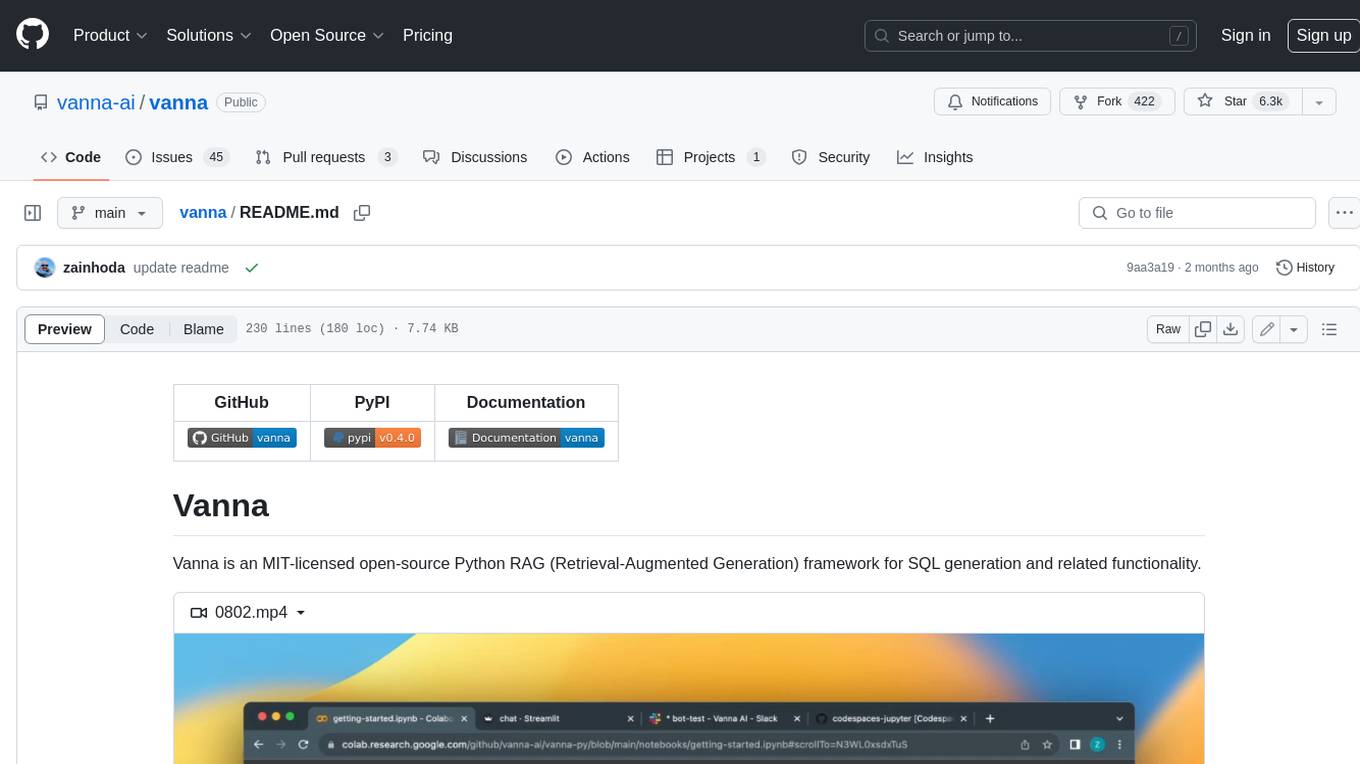
vanna
Vanna is an open-source Python framework for SQL generation and related functionality. It uses Retrieval-Augmented Generation (RAG) to train a model on your data, which can then be used to ask questions and get back SQL queries. Vanna is designed to be portable across different LLMs and vector databases, and it supports any SQL database. It is also secure and private, as your database contents are never sent to the LLM or the vector database.

databend
Databend is an open-source cloud data warehouse that serves as a cost-effective alternative to Snowflake. With its focus on fast query execution and data ingestion, it's designed for complex analysis of the world's largest datasets.

Avalonia-Assistant
Avalonia-Assistant is an open-source desktop intelligent assistant that aims to provide a user-friendly interactive experience based on the Avalonia UI framework and the integration of Semantic Kernel with OpenAI or other large LLM models. By utilizing Avalonia-Assistant, you can perform various desktop operations through text or voice commands, enhancing your productivity and daily office experience.
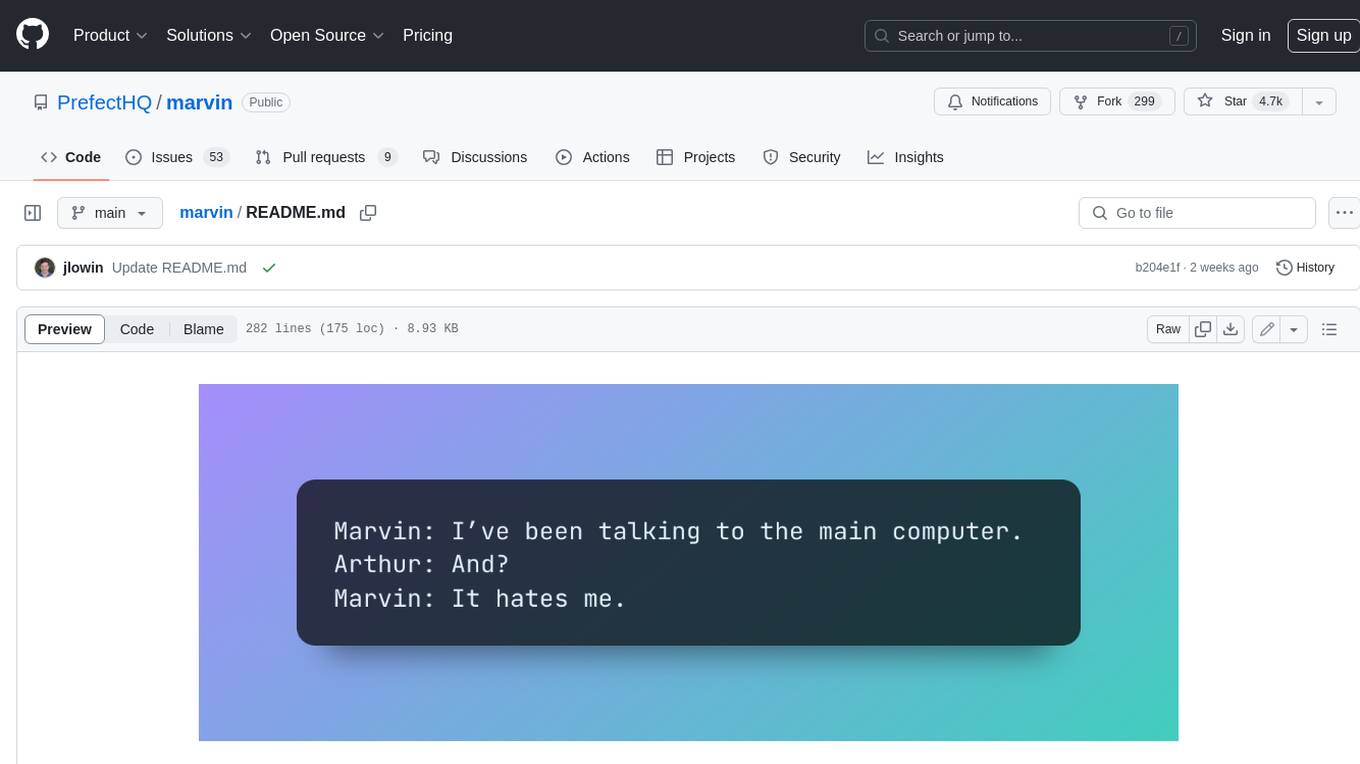
marvin
Marvin is a lightweight AI toolkit for building natural language interfaces that are reliable, scalable, and easy to trust. Each of Marvin's tools is simple and self-documenting, using AI to solve common but complex challenges like entity extraction, classification, and generating synthetic data. Each tool is independent and incrementally adoptable, so you can use them on their own or in combination with any other library. Marvin is also multi-modal, supporting both image and audio generation as well using images as inputs for extraction and classification. Marvin is for developers who care more about _using_ AI than _building_ AI, and we are focused on creating an exceptional developer experience. Marvin users should feel empowered to bring tightly-scoped "AI magic" into any traditional software project with just a few extra lines of code. Marvin aims to merge the best practices for building dependable, observable software with the best practices for building with generative AI into a single, easy-to-use library. It's a serious tool, but we hope you have fun with it. Marvin is open-source, free to use, and made with 💙 by the team at Prefect.

activepieces
Activepieces is an open source replacement for Zapier, designed to be extensible through a type-safe pieces framework written in Typescript. It features a user-friendly Workflow Builder with support for Branches, Loops, and Drag and Drop. Activepieces integrates with Google Sheets, OpenAI, Discord, and RSS, along with 80+ other integrations. The list of supported integrations continues to grow rapidly, thanks to valuable contributions from the community. Activepieces is an open ecosystem; all piece source code is available in the repository, and they are versioned and published directly to npmjs.com upon contributions. If you cannot find a specific piece on the pieces roadmap, please submit a request by visiting the following link: Request Piece Alternatively, if you are a developer, you can quickly build your own piece using our TypeScript framework. For guidance, please refer to the following guide: Contributor's Guide